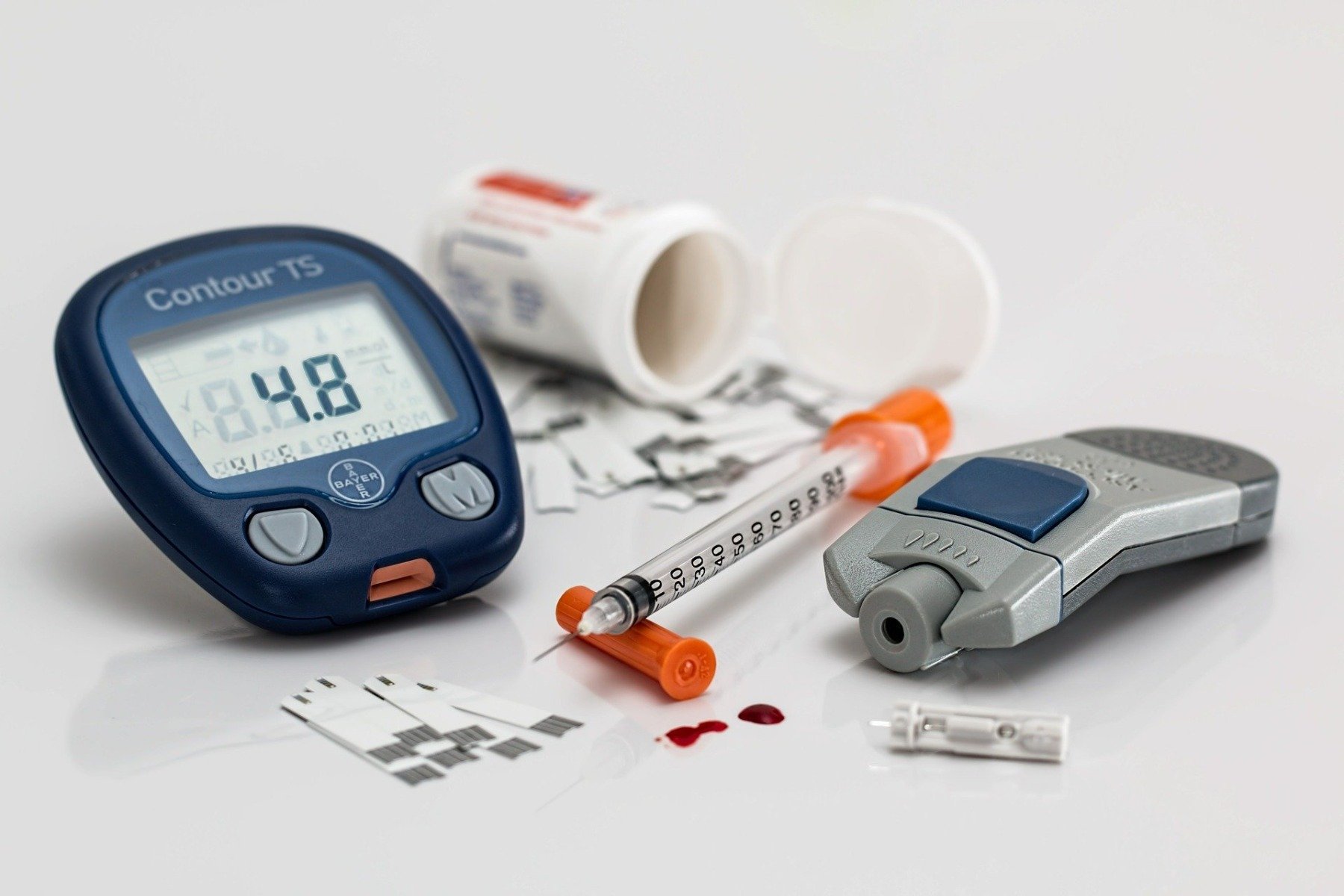Table of Contents
Lose 2 kilograms a week without extensive exercising! Does it sound tempting? Exactly this promise is promoted by companies selling the ketogenic diet products. However, is such rapid weight reduction good for our health? Look with us at all the risks, facts and myths connected to the ketogenic diet!
What is Ketogenic Diet?
Ketogenic diet is a type of diet with low amount of carbohydrates and high amount of fats by contrast. While in case of rational nutrition, we take about 45–55 % of carbohydrates, 15–20 % of proteins and up to 30 % of fats, keto diet allows you to take only 5 % of carbohydrates. However, fats account for as much as 75 % of all energy intake amount. [1] [2]
This diet is based on forcing the body to burn fat because there is a low amount of carbohydrates in the body. These are usually transformed into glucose which is then transported into the body and is particularly important in supporting the brain function. [1] [2] [13]
What is Ketose?
If the body stops cleaving carbohydrates into energy and starts using fats as a substitutional source instead, a metabolic phenomenon known as ketose occurs. A process during which the body is slowly getting into such state is called ketogenese. [32] Ketose is based on the production of ketons, organic compounds which in small doses serve as the substitution for carbohydrates. However, if ketons are produced in body too quickly and they accumulate in blood and urine, it can lead to ketoacidosis. [6] [7] It is a process in which certain changes of organs’ functions take place, mainly regarding liver and other important organs to which is transported the energy from carbohydrates. This may cause improper functioning of these organs. [2] [6] [7] [13]

There are various different possibilities how you can get into the state of ketose. Among them are for example the following:
- Starvation – already in 400 B.C., a Greek physician Hippocrates discovered the effects of ketosis. He prescribed a cure by starvation to a patient suffering from seizures similar to the epileptic ones. The period of fast caused that the seizures were alleviated. These are the first proven effects of ketosis on the metabolic problems. That means that if you stop taking any nutrients, your body will get into the state of ketosis within several tens of hours.
- Ketogenic diet – keeping a low-carb diet causes that all resources of carbohydrates which are normally transformed into energy will run low and body will be forced to search for an alternative source of energy – fats transforming into ketons. In the process when the body starts using fats as a source of energy occurs the ketosis. To get your body into the state of ketosis is not necessary only to keep a strict hunger-strike, but it is also enough to markedly reduce the intake of carbohydrates.
- Supplements for ketons replenishment – on the market, there are many nutritional supplements that can help you supply ketons into your body. However, most of them are supplements that can speed up the ketone formation if you are already following the ketogenic diet. Since most of the products are relatively new, there are no relevant studies carried out on people which would confirm the effects of keto supplements on ketosis. [32] However, it is not excluded that in the future will such nutritional supplements have the same effects as the ketogenic diet.
You might be interested in these products:
Effects of the Ketogenic Diet
Ketogenic diet has become increasingly popular in the last years. The main reason for it is the fact that it can lead to a heavy weight loss. As we have already mentioned, your body will expire the necessary amount of carbohydrates and it will stop transforming glucose into energy, therefore it will start searching for an alternative source of energy, which are fats. [2] [3] [13]
However, these effects of ketogenic diet have been discovered as its side effect. Ketogenic diet has been used in the medical field for more than 100 years. Its effects were recorded in 1911, when it was used as an epilepsy treatment for the first time. [4] Later it was discovered that patients undergoing the keto diet were losing weight during the treatment. And exactly this led to the popularity of ketogenic diet as a quick weight loss method.
Gradually, its magic was discovered by celebrities and professional athletes, such as Gwyneth Paltrow, Kim Kardashian or LeBron James, who promote keto diet as their diet plan for weight loss. However, they also include the ketogenic style of diet into their lifestyle only in short-term intervals. [5]

Types of Ketogenic Diet
We know several types of ketogenic diet. They differ mainly in the ratio of important macronutrients intake. Among them are the following:
- standard ketogenic diet (SKD) – it is a diet with a low amount of carbohydrates ( 5–10 %), moderate amount of proteins (20 %) and high level of fats (70–75 %).
- cyclical ketogenic diet (CKD) – it is a diet that alternates days during which you consume low level carb foods and days when you take a high amount of carbs. Example: 5 days of low level carb diet and 2 days of high level carb diet.
- targeted ketogenic diet (TKD) – you consume food with higher amount of carbs during the trainings and training days and you keep a low carb diet in days without trainings.
- high-protein ketogenic diet – it is similar to the standard ketogenic diet, but it includes a higher amount of proteins (35 %, 60 % fats, 5–10 % carbohydrates). [28]
Recommended is the cyclical ketogenic diet that alternates the high and low intake of carbohydrates. It is the safest type of diet with a low amount of carbohydrates. [28]
Ketogenic Diet Foods
Since keto diet allows you to take only 5 % of carbohydrates as opposed to 75 % of fats, following the keto diet can be a bit problematic. You should leave out foods with a high amount of carbohydrates, such as:
- legumes (beans, peas, lens)
- peanuts
- fruit
- dairy products
- rice
- flavoured drinks
- sweet food
- alcoholic drinks
- pastry and bread
Among the products which are allowed in keto diet are foods with a high amount of fats and proteins, such as:
- meat – chicken, turkey, beef
- fish
- low-carb vegetables – tomatoes, aubergine, asparagus, broccoli, cauliflower, leafy vegetables, avocado
- eggs
- cheese
- whole milk and curd cheese
- pumpkin and sesame seeds
- nuts and natural 100 % hazelnut butters [29]

A great way how to achieve a feeling of saturation in ketogenic diet is to take in a whey protein. Not only it has great effects in weight reduction, but it also secures the feeling of saturation. It is recommended to take in a pure whey protein without any flavour. This protein contains approximately 2 grams of carbohydrates per one 30 gram measure of protein.
Benefits of Ketogenic Diet
Ketogenic diet has a long history, so there have been many studies exploring its effects. These studies have focused mainly on its influence on the weight reduction, treatment of epilepsy and other metabolic diseases. We will discuss also these benefits within the following lines.
1. Keto Diet and Weight Loss
The main reason why ketogenic diet is so popular is its influence on weight loss. The effects of keto diet on weight reduction are significant and they appear in a short time. [8] When your body stops transforming carbohydrates into energy and starts cleaving fat instead, numbers on your scale will decrease rapidly. You can lose up to 2 kilograms per week with it. [8]
In one 8-week study, a group of young men took part in a programme which included the intake of ketogenic diet. They were divided into two groups – one consumed the keto diet foods and the other one had a common balanced diet. The study resulted into a lower weight increase in case of the group that took the keto diet food as opposed to the group that had the balanced diet food. [30]
In the first weeks of keto diet, mostly water is washed out from your body. This means that as soon as you stop following keto diet and start taking carbohydrates, you can expect a repeated weight increase, and the yo-yo effect will appear. [8] [9] [10] [13]
However, looking from a short-term point of view, ketogenic diet can be an effective way how to lose weight quickly. But if you would follow this diet for a long period of time, it could be very harmful for your body. [6] Next to other harmful effects, so called keto flu can appear. We will discuss it in depth below. [13]

2. Keto Diet and Epilepsy Symptomps Reduction
Firstly, keto diet was used to cure epilepsy. Many studies have proven that keto diet is very effective in reducing and controlling the seizures which are caused by epilepsy. However, it does not cure this disease. In certain cases, the effect of following this diet is equal to taking antiepileptic medicaments, regarding the epileptic seizures. [11] [13]
One study carried out on 103 children focused on the impact of keto diet on epileptic seizures. During a 3-month period, one group consumed food following a strict katogenic diet, while the other group did not. The average percentage of epileptic seizures within the group of children who kept diet was much lower than in the other group. In the first group was about 75 % less seizures. However, the research did not end without any side effects which keto diet brings in large numbers and these were mostly constipation, lack of energy and hunger. [12] You should follow ketogenic diet as a way of metabolic disorders treatment only if you are under control of an experienced physician. [32]
3. Ketogenic Diet and Type 2 Diabetes
Type 2 Diabetes is a condition which influences the control of level of sugar in blood. It is characteristic for its changes in metabolism, high level of blood sugar, disorder of insulin function and obesity. [14]
Insulin serves to transfer glucose within the body. However, people suffering from diabetes do not have a properly working insulin which disrupts the ability of body to effectively use carbohydrates and the level of sugar in blood increases. A lower intake of carbohydrates in diet can help to eliminate sugar in blood, which can lower the need for insulin. One research has found out that ketogenic diet improved the insulin sensitivity in case of patients suffering from diabetes in about 75 %. [15]
One of the side effects that appears in case of people suffering from diabetes is also obesity. Ketogenic diet can help in this case, too, because it can help people with a diabetes disorder to lose excessive kilograms. [14] [16]

Disadvantages of Ketogenic Diet
When your body starts taking fats as a source of energy, it gets into the state of ketosis and it will undergo various metabolic changes. However, many of them bring some unpleasant risks. Ketogenic diet is safe for healthy people, but adapting the body for a low intake of carbohydrates can cause various side effects. Look at several most frequent threats which can be caused by ketogenic diet.
1. Less Muscle Mass and Yo-yo Effect
Carbohydrates are very important for muscle mass formation, because they are partially converted into glykogene which is stored in muscles and helps them to grow and regenerate. When your body enters into ketosis, you start losing the accumulated carbohydrates even from muscles and thus the amount of muscle mass is reduced. [17]
During one 8-week study, the influence of ketogenic diet on muscle formation was observed in case of young men in their thirties. Men were divided into two groups, one in which men followed ketogenic diet and the other one in which men had a common diet. The study resulted into a finding that the group which followed keto diet lost more kilograms, but it these men were not able to build muscles as much as the men in the group that took a normal amount of carbohydrates. [9]
If you stop following keto diet, it can take some time until your body will be able to form muscle mass again. It is because you consumed a huge amount of fats on keto diet and body needs to get rid of them before it starts using carbohydrates for muscle growth. [17] These changes can cause also the differences in the speed of metabolism. [18]

2. Keto Flu
Even after several days or weeks isn’t your body able to get out of the ketose state and it is getting used to low intake of carbohydrates. Among main symptoms of long-lasting ketose state belongs ketogenic flu which may look like a common flu at first sight. It is accompanied by fever, nausea, vomiting, headaches and fatigue. [19] These symptoms are the result of temporary imbalances in energy sources, insulin and minerals in the body. [1]

3. Bad Breath
A common side effect of ketosis is a bad breath that comes into existence because ketones leave the body with breath and urine. If you follow ketogenic diet, you can observe that your breath smells sweetly. This is caused by ketons, such as acetone, benzophenone and acetophenone. [20]
The side effects last as long as your body remains in the ketosis state, therefore it is impossible to get rid of them naturally. However, you can reduce it by using sugar-free chewing gums which you are allowed to use in keto diet. Moreover, it is recommended to drink water regularly and occasionally rinse your mouth with clean water. [21]
4. Lack of Vitamins, Minerals and Fatigue
Ketogenic diet doesn’t allow you to consume fruit and certain kinds of vegetable. These contain a lot of vitamins and minerals and their low intake can cause several adverse effects. When you are on keto diet, your body starts excluding carbohydrates, water and glycogen, while you are also losing electrolytes, such as sodium, potassium and magnesium. [22]
A sudden decrease of intake of carbohydrates, in which there are many vitamins and minerals can lead to decrease of your energy level. Some people following keto diet claimed that they felt fatigue and confusion. [22] To avoid these negatives, you should replenish the supply of minerals and vitamins by means of nutritional supplements.

5. Risky Pregnancy and Irregular Menstrual Cycle
A low intake of carbohydrates can have adverse effects for pregnant and breastfeeding women. If you are pregnant and you are following diet with a low intake of carbohydrates, it can influence the weight of your baby, his growth and it can also prevent you from obtaining various substances which are necessary for your baby’s health. [23]
Moreover, if you will not consume enough carbohydrates, you can come across a problem in form of irregular menstrual cycle. In one 6-month study which examined the impact of low-carb diet on healthy women, it was discovered that almost half of them suffered from an irregular menstrual cycle after the research. [24]

6. Constipation
As we have already mentioned earlier, consumption of fruits and vegetables is very limited when following a strict low-carb diet. Nevertheless, fruits and vegetables are great sources of not only vitamins and minerals, but also of fiber which promotes intestines movements, regular laxation and is necessary for a healthy intestinal flora. If there is a low amount of fiber in a body, it will suffer from constipation. [25] [26] [27] One research has proven that children who followed ketogenic diet met with a side effect in form of constipation. [31] In majority of cases it happens because the large intestine absorbs too much water from the food. The slower the food moves through our digestive system, the more water is being absorbed by the large intestine. As a result, the stool becomes dry and hard, leading to painful pooping. [25] [27]
Who is Ketogenic Diet Suitable For?
From a short-term point of view is ketogenic diet an effective way how to lose a few kilograms. Basically, just as any other diet, keto diet works on basis of caloric deficit which can be achieved by controlling the food intake and reducing the intake of carbohydrates. Therefore, you should bear in mind that in the first weeks, water washes out of your body and as soon as you stop following keto diet, you will gain the kilos back. [26] Moreover, if your body undergoes a shock from lack of carbohydrates, it can cause many health problems, mainly from the long-term point of view. [1]
So, who is ketogenic diet suitable for? If you long for a quick weight reduction with a short-term effect, then ketogenic diet is just for you. In case you suffer from metabolic problems, such as type 2 diabetes or epilepsy, treatment by means of ketogenic diet could be effective for you, however, make sure you follow it under control of an experienced physician. [32] [13]
Who is ketogenic diet unsuitable for? If you would like to reduce your weight from a long-term point of view, then ketogenic diet is not the right choice for you. Moreover, it is not good for pregnant and breastfeeding women or for a women with irregular menstruation cycle. It is also not recommended to follow keto diet if you are an active athlete because it can cause the loss of muscle mass. [32]
It is really necessary to consider whether you want to start consuming the low-carb food or not. We believe you got to know all the important information about ketogenic diet and its effects on your body. If you liked this article, we will be very thankful if you will support it with like and sharing.
[1] Wajeed Masood; Kalyan R. Uppaluri. - Ketogenic Diet – https://www.ncbi.nlm.nih.gov/books/NBK499830/
[2] Phinney SD, Bistrian BR, Evans WJ, Gervino E, Blackburn GL. - The human metabolic response to chronic ketosis without caloric restriction: preservation of submaximal exercise capability with reduced carbohydrate oxidation. – https://www.ncbi.nlm.nih.gov/pubmed/6865776
[3] Fukao T, Lopaschuk GD, Mitchell GA. - Pathways and control of ketone body metabolism: on the fringe of lipid biochemistry. – https://www.ncbi.nlm.nih.gov/pubmed/14769483
[4] Gianfranco Cappello, Antonella Franceschelli, Annalisa Cappello and Paolo De Luca - Ketogenic enteral nutrition as a treatment for obesity: short term and long term results from 19,000 patients – https://www.ncbi.nlm.nih.gov/pmc/articles/PMC3557201/
[5] Moira Lawler - 12 Celebrities Who Can’t Get Enough of the Ketogenic Diet – https://www.everydayhealth.com/ketogenic-diet/diet/celebrities-cant-get-enough-ketogenic-diet/
[6] Patrycja Puchalska and Peter A. Crawford - Multi-dimensional roles of ketone bodies in fuel metabolism, signaling, and therapeutics – https://www.ncbi.nlm.nih.gov/pmc/articles/PMC5313038/
[7] Cooper Medical School of Rowan University, Camden, NJ, USA. - Diabetic ketoacidosis: evaluation and treatment. – https://www.ncbi.nlm.nih.gov/pubmed/23547550
[8] M U Yang and T B Van Itallie - Composition of weight lost during short-term weight reduction. Metabolic responses of obese subjects to starvation and low-calorie ketogenic and nonketogenic diets. – https://www.ncbi.nlm.nih.gov/pmc/articles/PMC333231/
[9] Salvador Vargas, Ramón Romance, Jorge L. Petro, Diego A. Bonilla, Ismael Galancho, Sergio Espinar, Richard B. Kreider and Javier Benítez-Porres - Efficacy of ketogenic diet on body composition during resistance training in trained men: a randomized controlled trial – https://www.ncbi.nlm.nih.gov/pmc/articles/PMC6038311/
[10] Keto’s popularity has led to an explosion of “experts” – https://examine.com/store/keto-guide/
[11] Hemingway C, Freeman JM, Pillas DJ, Pyzik PL. - The ketogenic diet: a 3- to 6-year follow-up of 150 children enrolled prospectively. – https://www.ncbi.nlm.nih.gov/pubmed/11581442
[12] Neal EG, Chaffe H, Schwartz RH, Lawson MS, Edwards N, Fitzsimmons G, Whitney A, Cross JH - The ketogenic diet for the treatment of childhood epilepsy: a randomised controlled trial. – https://www.ncbi.nlm.nih.gov/pubmed/18456557
[13] Rudy Mawer, MSc, CISSN - A Ketogenic Diet to Lose Weight and Fight Disease – https://www.healthline.com/nutrition/ketogenic-diet-and-weight-loss#section1
[14] Andrea Mario Bolla, Amelia Caretto, Andrea Laurenzi, Marina Scavini, and Lorenzo Piemonti - Low-Carb and Ketogenic Diets in Type 1 and Type 2 Diabetes – https://www.ncbi.nlm.nih.gov/pmc/articles/PMC6566854/
[15] Cell Biochemistry, Hannah Research Institute - Insulin stimulation of hepatic triacylglycerol secretion in the insulin-replete state: implications for the etiology of peripheral insulin resistance. – https://www.ncbi.nlm.nih.gov/pubmed/12079835
[16] Abdullah S Al-Goblan, Mohammed A Al-Alfi and Muhammad Z Khan -Mechanism linking diabetes mellitus and obesity – https://www.ncbi.nlm.nih.gov/pmc/articles/PMC4259868/
[17] Salvador Vargas, Ramón Romance, Jorge L. Petro, Diego A. Bonilla, Ismael Galancho, Sergio Espinar, Richard B. Kreider and Javier Benítez-Porrez - Efficacy of ketogenic diet on body composition during resistance training in trained men: a randomized controlled trial – https://www.ncbi.nlm.nih.gov/pmc/articles/PMC6038311/
[18] Krzysztof Durkalec-Michalski, Paulina M. Nowaczyk and Katarzyna Siedzik - Effect of a four-week ketogenic diet on exercise metabolism in CrossFit-trained athletes – https://www.ncbi.nlm.nih.gov/pmc/articles/PMC6451242/
[19] Cliff J. d C. Harvey, Grant M. Schofield, and Micalla Williden - The use of nutritional supplements to induce ketosis and reduce symptoms associated with keto-induction: a narrative review – https://www.ncbi.nlm.nih.gov/pmc/articles/PMC5858534/
[20] Andreas T. Güntner, Julia F. Kompalla, Henning Landis, S. Jonathan Theodore, Bettina Geidl, Noriane A. Sievi, Malcolm Kohler, Sotiris E. Pratsinis, and Philipp A. Gerber - Guiding Ketogenic Diet with Breath Acetone Sensors – https://www.ncbi.nlm.nih.gov/pmc/articles/PMC6264102/
[21] Natalie Olsen, RD, LD, ACSM EP-C - Everything You Need to Know About Keto Breath – https://www.healthline.com/health/keto-breath
[22] Elaine C. Wirrell - Ketogenic Ratio, Calories and Fluids: Do They Matter? – https://www.ncbi.nlm.nih.gov/pmc/articles/PMC2656445/
[23] Robert Preidt - Low-Carb Diets Boost Risk of Serious Birth Defects – https://www.webmd.com/baby/news/20180130/low-carb-diets-boost-risk-of-serious-birth-defects
[24] Mady MA, Kossoff EH, McGregor AL, Wheless JW, Pyzik PL, Freeman JM - The ketogenic diet: adolescents can do it, too. – https://www.ncbi.nlm.nih.gov/pubmed/12790900
[25] A Paoli, A Rubini, J S Volek and K A Grimaldi -Beyond weight loss: a review of the therapeutic uses of very-low-carbohydrate (ketogenic) diets – https://www.ncbi.nlm.nih.gov/pmc/articles/PMC3826507/
[26] Joshi Shilpa and Viswanathan Mohan - Ketogenic diets: Boon or bane? – https://www.ncbi.nlm.nih.gov/pmc/articles/PMC6251269/
[27] Mojgan Forootan, MD,a Nazila Bagheri, MD,b and Mohammad Darvishi, MDc - Chronic constipation – https://www.ncbi.nlm.nih.gov/pmc/articles/PMC5976340/
[28] Editor - Types of ketogenic diet – https://www.diabetes.co.uk/keto/types-of-ketogenic-diet.html
[29] Your Ultimate Keto Diet Grocery List – https://www.health.com/nutrition/keto-diet-grocery-list
[30] Salvador Vargas, Ramón Romance, Jorge L. Petro, Diego A. Bonilla, Ismael Galancho, Sergio Espinar, Richard B. Kreider and Javier Benítez-Porres - Efficacy of ketogenic diet on body composition during resistance training in trained men: a randomized controlled trial – https://www.ncbi.nlm.nih.gov/pmc/articles/PMC6038311/
[31] Wibisono C, Rowe N, Beavis E, Kepreotes H, Mackie FE, Lawson JA, Cardamone M - Ten-year single-center experience of the ketogenic diet: factors influencing efficacy, tolerability, and compliance. – https://www.ncbi.nlm.nih.gov/pubmed/25649120
[32] Krista Scott-Dixon, Ph.D. and Helen Kollias, Ph.D. - The Ketogenic Diet: Does it live up to the hype? – https://www.precisionnutrition.com/ketogenic-diet


Add a comment